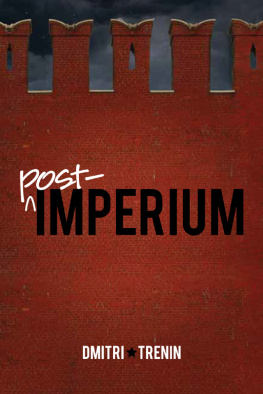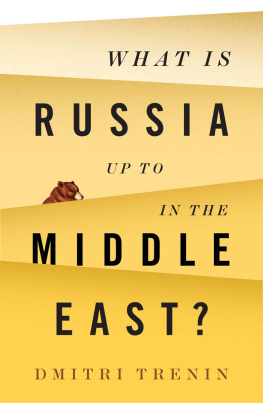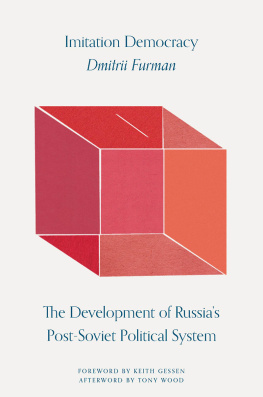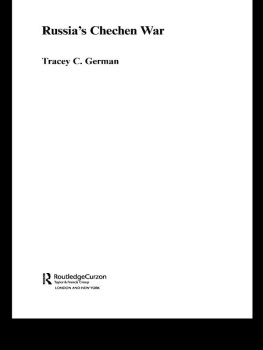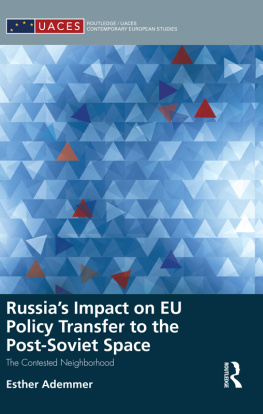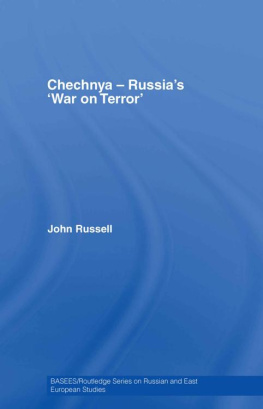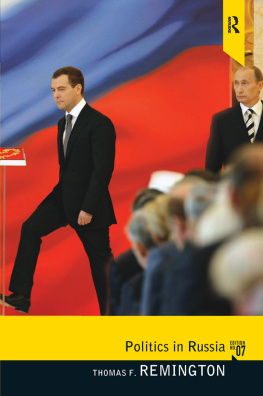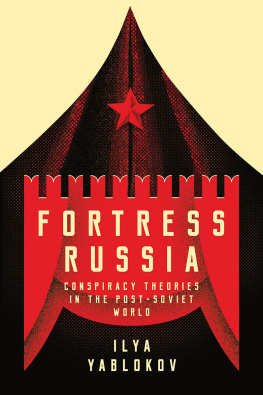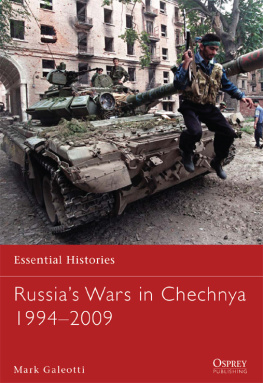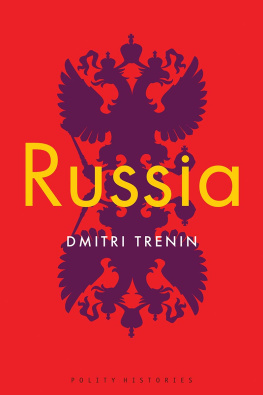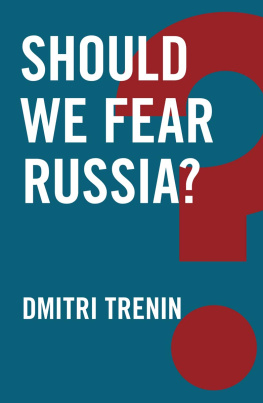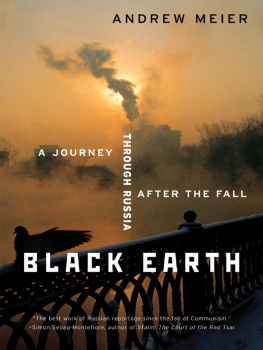
2012 Carnegie Endowment for International Peace. All rights reserved.
No part of this publication may be reproduced or transmitted in any form or by any means without written permission from the Carnegie Endowment.
Carnegie Endowment for International Peace
1779 Massachusetts Avenue, N.W.
Washington, D.C. 20036
202-483-7600, Fax 202-483-1840
www.ceip.org
The Carnegie Endowment does not take institutional positions on public policy issues; the views represented here are the authors own and do not necessarily reflect the views of the Endowment, its staff, or its trustees.
To order, contact:
Hopkins Fulfillment Service
P.O. Box 50370, Baltimore, MD 21211-4370
1-800-537-5487 or 1-410-516-6956
Fax 1-410-516-6998
Library of Congress Cataloging-in-Publication Data
Trenin, Dmitri.
Post-imperium : a Eurasian story / Dmitri Trenin.
p. cm.
ISBN 978-0-87003-248-6 (pbk.)
ISBN 978-0-87003-249-3 (cloth)
ISBN 978-0-87003-345-2 (e-book)
1. Russia (Federation)History1991-
2. Russia (Federation)Politics and government1991-
3. Russia (Federation)Social conditions1991-
4. Russia (Federation)Economic conditions1991-
5. Russia (Federation)Foreign relations.
6. Russia (Federation)Foreign economic relations.
I. Title.
DK510.76.T73 2011
947.086dc22
2011013975
Cover design by Zeena Feldman and Jocelyn Soly
Maps by Robert Cronan, Lucidity Information Design
To Petr Trenin-Strausov, 30, of Russias first free generation
Twenty-first century Russia is strikingly different from the Russia of old. The collapse of communism ushered in an era free of ideology and values. Forced collectivism gave way to rampant individualism. In todays Russia, the private trumps the public, for better and worse. With its five hundred-year-old empire a piece of history and its superpower ambitions put to rest, Russia is now looking inward, rather than outward.
In place of a historical empire and politico-military superpower status, Russia seeks to establish itself as a great power. In the eyes of Russias leaders, this means Moscows strategic independence from the principal centers of power in the new century: America and China. Shaping a new role after an imperial decline and fall is not easy, as several European nations discovered in the twentieth century. Performing the same feat without pooling sovereignty with others is virtually unprecedented.
Dmitri Trenins Post-Imperium: A Eurasian Story details Russias effort. This is not a story about the old empiretsarist or Sovietbut about the new stage in Russias development. Moscows domestic and external actions during this period are criticalthey will affect Russia and its neighbors for years to come and have a palpable impact on the global balance of power.
Trenin has been both an analyst of and a participant in Russias struggle to transform itself. There are few, if any, more astute observers of this critical period, and certainly none with as clear and powerful a pen. In this new volume he takes up the challenge to illuminate Russias path forward. In a world no longer defined by Cold War bipolarity or the immediate postCold War hegemony of the United States, Russia operates today in a post-imperial world where power is shifting from the West toward Asia and other non-Western actors, influence is defined by economics, knowledge, and information, and military power is increasingly exercised asymmetrically. To understand this new world, Trenin examines domestic conditions in Russia and its neighbors, detailing how the end of the empire has affected their political systems and institutions, economy, social structures, and values.
Trenin also examines the geopolitical and security relationships of Russia and its neighbors, looking at post-Soviet associationsfrom the Commonwealth of Independent States to the Shanghai Cooperation Organizationand the challenges posed by NATO and EU enlargement. He reflects on the roles other powers play in the various post-Soviet regions.
The post-imperial period has led to significant changes in how Russia conducts its economic relations with other nations. The country made immature attempts at integration into and with the West, first attempting to assert itself as an independent great power only to discover its glaring deficiencies. Energy figures prominently in Russias sometimes contentious relationships with its trading partners, as demonstrated by the gas war with Ukraine and pipeline and transit politics. As a result, Russias reputation in Europe and the rest of the world has suffered and it is clear that how Moscow handles its relationships with its neighbors will have far-reaching effects.
Russias potentially disastrous demographic problems will also impact its prospects for post-imperial success. Since the collapse of communism, the country has faced diminishing life expectancy, higher mortality, declining standards of health care, greater incidences of substance and alcohol abuse, lower birth rates, and increased numbers of suicides. Government policies have done little to improve conditions. In addition, Russias approach to immigration and labor migrationas well as the emergence of national identities, the renewed role of religion in society, language policies, and the debates over historical memorywill affect whether or not it succeeds.
An empire no more, Russia today faces a daunting list of challenges. The country must modernize to become competitive in the global economy and move away from the Cold War and zero-sum-game mentality that still underlies many of its actions. But, Trenin argues, there is reason to be hopeful. While no longer an empire or a superpower, Russia remains relevanteconomically, culturally, and geopolitically. If it can adapt to twenty-first century realities and learn to cooperate withnot antagonizeits neighbors, Russia can emerge as a major and responsible player in the new world order.
Jessica T. Mathews
President, Carnegie Endowment for International Peace
Let me begin the book with a personal anecdote. In 1999 or 2000, I was flying from Shanghai to Moscow. At that time, many Russian citizens were still using passports with the old Soviet insignia, featuring the hammer and sickle emblazoned on the globe, with the star above it. After 1991, there were two basic reasons for the Russian government to continue to use the passport forms of a recently defunct state. One was sheer economy: The remaining stock of Soviet passports was just too large and too precious to be simply disposed of. The other one was the legal situation: The double-headed eagle was not officially approved by the State Duma as Russias national emblem until 2000. There was a third reason, too. As a senior Duma member told me in the mid-1990s, there was no guarantee that the post-Soviet separation would last. He was by no means alone in holding that view.
Well, back to Pudong International Airport. At the check-in counter, I handed my Soviet-era passport, which inside clearly described me as a citizen of the Russian Federation, to a young Chinese airline assistant. She looked through my papers once, then leafed through them backward, then, without addressing me, went to see her superior. She did not speak English and could not tell me what the problem was with my passport. It took a while before a more senior person appeared, smiled, and said: Sorry, the lady is too young to remember the Soviet Union. Indeed, a decade is a long time for youngsters.


